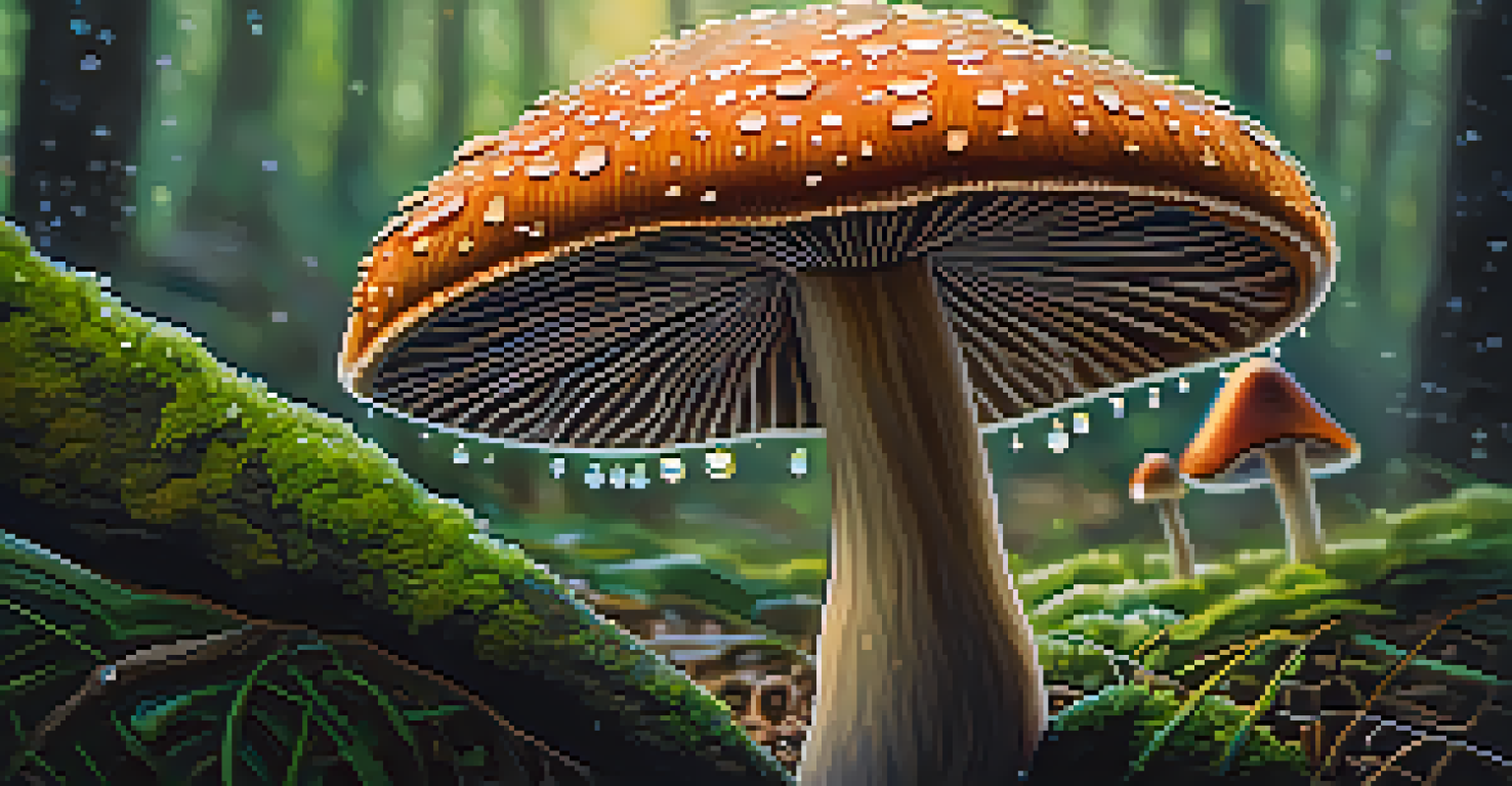Psychedelics in Religion: The Role of Entheogens in Faith

Understanding Entheogens and Their Role in Religion
Entheogens, derived from the Greek words meaning 'generating the divine within,' are substances that many cultures have historically used to facilitate spiritual experiences. These include natural psychedelics like psilocybin mushrooms and peyote, which have been revered in various traditions. The concept centers around the belief that these substances can connect individuals to a higher power or divine presence, enhancing their spiritual journey.
Psychedelics are a way to explore the depths of consciousness and reveal the interconnectedness of all things.
In many indigenous cultures, entheogens are not just tools for recreation; they are sacred elements of religious rituals. For instance, the use of ayahuasca in Amazonian tribes is a profound spiritual practice that aims to heal and expand consciousness. This illustrates how deeply intertwined psychedelics are with faith, serving as a bridge between the physical and spiritual realms.
Moreover, the modern resurgence of interest in psychedelics has reignited discussions about their potential spiritual benefits. As people seek deeper meaning in their lives, entheogens are increasingly viewed through a spiritual lens, suggesting that these substances hold keys to understanding the divine.
Historical Context of Psychedelics in Religious Practices
Psychedelics have a rich history in religious contexts, dating back thousands of years. Ancient civilizations, such as the Aztecs and Incas, utilized these substances in their spiritual rituals, believing they provided access to the divine. This historical usage emphasizes the longstanding connection between psychedelics and religious experiences, revealing how integral they have been to various faiths.

In the early 20th century, the study of psychedelics began to surface in Western culture, often linked with mystical experiences. Figures like Aldous Huxley explored substances like mescaline, arguing that they could induce profound spiritual insights. This sparked a wave of interest in how psychedelics could enhance religious experiences, leading to both fascination and controversy.
Entheogens Enhance Spirituality
Entheogens, like psychedelics, are historically used in various cultures to facilitate profound spiritual experiences and connection to the divine.
However, the societal perception of psychedelics shifted dramatically in the latter half of the century, especially during the counterculture movements. Despite legal restrictions and stigma, many spiritual seekers continued to explore these substances, often seeking authentic connections to their faith.
Psychedelics in Indigenous Spiritual Practices
Indigenous cultures worldwide have long embraced psychedelics as integral components of their spiritual practices. For example, the Native American Church incorporates peyote into its rituals, viewing it as a sacrament that facilitates communion with the divine. This practice underscores the belief that entheogens are not merely substances, but sacred tools for spiritual growth.
The use of psychedelics in spiritual practices is about opening the door to the divine within ourselves.
Similarly, the Shipibo-Conibo people of the Peruvian Amazon use ayahuasca in ceremonies aimed at healing and connecting with ancestors. The visionary experiences induced by ayahuasca are seen as a way to gain wisdom and insight, reinforcing the sacred nature of these substances within their spiritual framework. Such practices highlight how entheogens are utilized to navigate the complexities of existence.
These indigenous traditions remind us that psychedelics have been part of human spirituality for centuries. They serve as a testament to the profound relationship between nature, consciousness, and the divine, illustrating that these substances can guide individuals toward transcendence and understanding.
Psychedelics and Mystical Experiences in Modern Religions
Modern religions are increasingly recognizing the potential role of psychedelics in facilitating mystical experiences. Some contemporary spiritual movements advocate for the use of entheogens as a means to achieve deeper states of consciousness and connection to the divine. This shift reflects a growing acceptance of alternative spiritual practices that incorporate these substances.
For instance, organizations like the Multidisciplinary Association for Psychedelic Studies (MAPS) are exploring how psychedelics can enhance therapeutic and spiritual experiences. Their research highlights the potential for these substances to promote healing and foster a sense of oneness with the universe. This aligns with the mystical aspirations of many modern spiritual seekers, who seek to transcend ordinary reality.
Indigenous Practices and Ethics
Many indigenous cultures view psychedelics as sacred elements of their spiritual practices, highlighting the importance of respecting cultural significance and ethical considerations surrounding their use.
As people increasingly turn to psychedelics for spiritual exploration, it raises questions about the future of religious practices. Will traditional faiths adapt to include these experiences, or will new spiritual movements emerge that center around psychedelics? This evolving landscape is a fascinating reflection of humanity's ongoing quest for meaning.
The Science Behind Psychedelics and Spirituality
Recent scientific research has begun to shed light on the relationship between psychedelics and spirituality. Studies indicate that psychedelics can induce profound experiences characterized by feelings of unity, transcendence, and connection to a greater reality. These experiences often mirror those described in spiritual texts and religious traditions, suggesting a shared core of human spirituality.
Neuroscientific investigations reveal that psychedelics affect brain networks associated with self-awareness and emotional processing. This neurological shift can lead to a breakdown of the ego, allowing individuals to experience a sense of interconnectedness with all that exists. Such findings support the idea that psychedelics may facilitate genuine spiritual experiences, offering insights into the nature of consciousness.
However, it’s essential to approach this research with caution, recognizing that spirituality is deeply personal and subjective. While science can provide insights into the mechanisms at play, the true essence of spiritual experiences often transcends empirical understanding. Thus, the intersection of science and spirituality remains a rich area for exploration, inviting both skepticism and wonder.
Ethical Considerations in the Use of Psychedelics
As interest in psychedelics grows, so do the ethical considerations surrounding their use in spiritual contexts. It's crucial to approach these substances with respect and understanding, recognizing their potential for both healing and harm. This duality emphasizes the need for informed and responsible usage, particularly in religious or spiritual settings.
Furthermore, there’s a growing concern about cultural appropriation when individuals from outside a tradition engage with these substances. It’s vital to honor the cultural significance and rituals associated with psychedelics, ensuring that practices are not commodified or misrepresented. Engaging with indigenous wisdom and respecting traditional practices can foster a more ethical approach to psychedelic spirituality.
Future of Psychedelics in Faith
As societal attitudes shift, psychedelics may play a pivotal role in reshaping modern spirituality and religious practices, merging healing with spiritual exploration.
Lastly, the legal status of psychedelics in many regions complicates their use in spiritual practices. Advocates argue for the decriminalization and regulation of these substances to ensure safe access for those seeking spiritual growth. By addressing these ethical dimensions, society can navigate the complexities of integrating psychedelics into modern spirituality.
The Future of Psychedelics in Religion and Spirituality
The future of psychedelics in religion and spirituality is a captivating subject, filled with potential and uncertainty. As societal attitudes shift and more research emerges, we may witness a renaissance of psychedelic spirituality, where entheogens are embraced as sacred tools for connection and healing. This evolution could lead to new forms of worship and community centered around shared mystical experiences.
Additionally, the integration of psychedelics into therapeutic practices may influence religious perspectives, blurring the lines between healing and spirituality. As mental health awareness grows, the potential of psychedelics to promote well-being could reshape how we view faith and our relationship with the divine. This potential fusion of science and spirituality offers exciting possibilities for personal and collective growth.

Ultimately, the journey of psychedelics in religion reflects humanity's ongoing quest for understanding and connection. As we explore these substances in new ways, we may uncover deeper truths about existence, consciousness, and our place in the universe, fostering a more interconnected spiritual landscape.